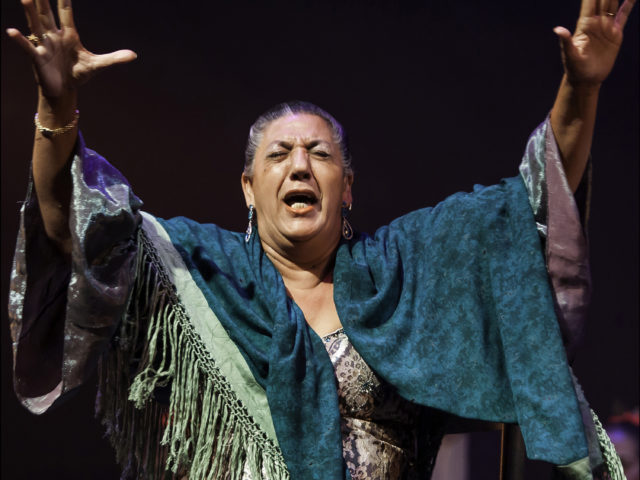Juana la del Pipa, once known as the “Tina Turner” of Flamenco, for her strong legs and dynamic nature, is still turning on passionate performances at 68.
The deep-voiced Gypsy cantaora (singer) was born and still lives in, Jerez de la Frontera, located in the Andalusian region of southern Spain. The city of more than 200,000 is best known for its sherry (“Jerez” is the Arabic word for “sherry”), its fine horses, and its classic Flamenco music and dance tradition. And like most of Andalusia, Jerez de la Frontera has a large Arab and Gypsy influence.
In many classic Flamenco songs, Juana says it is customary that many lyrics are in Caló – their Gypsy dialect. However, her primary language is Spanish. When having a conversation, she ends almost every sentence with “cariño.” The Spanish expression for “my love.”
Juana seems to live every day driven by feelings. Flamenco, an extremely emotional musical genre, seems to run through her veins and make her heart beat. And when she sings, the words seem to flow from the depths of her gut, through her heart, and out of her mouth with a passionate force only capable from a deep-seated love, which has also known great pain and sadness.
“It came down through my genes,” says Juana in her in her native Spanish. “It is my life, and everything I feel, my love.”
From as far back as she can remember, Juana remembers Flamenco being a part of her life. After all, she lived her entire life in Barrio Santiago, the neighborhood coined as the birthplace of classic Flamenco, and nearly all of her family members are Flamenco musicians of some form. Her nephew is the world-renowned Antonio El Pipa.
“It’s important in Flamenco circles to know what town you’re from,” explains Juana, who is related to the Parrilla guitar-playing family and both the Zambo and Terremoto singing clans. “Barrio Santiago is where you can hear the best original Flamenco – the most Gypsy. We have a certain way of approaching the rhythm.”
It is common for families there to sing and dance together, as Flamenco expresses her people’s way of life, their philosophy, their struggles and pride in their culture.
Juana started singing among her family at age 11. Then at 15, she sang at the Mairena del Alcor Festival, which began her professional singing career.
“I felt marvelous the first time,” says Juana. “It was, I don’t know what I felt…I can’t explain it.”
She says she was mainly influenced by the talents of Manolo Caracol, Tio Borrico, and Terremoto, because their singing reflected her Gypsy culture, and they transmitted deep feelings.
But the most memorable moment of her career, she says, was at 15, when she sang a solea for her mother, while her mother danced for her.
“That was an incredible honor for me,” says Juana, explaining that it took place at the wedding of her niece.
Her mother played an integral role in her life. Juana inherited her name, “Juana la del Pipa,” from her mother, a world-famous Flamenco dancer. And her mother got the name, because when she was young, she sold “pipas,” the Spanish word for “sunflower seeds.”
“She was a great person,” reminisces Juana. “[Her character] was the first thing I learned about her. And she danced until she died.”
Today, when Juana’s not on tour, or performing at an event or family functions, she spends her days cleaning, cooking and taking care of her 19 grandchildren.
Professionally, she sings as soloist in many festivals around the world, accompanied by different guitarists. Most recently, she will be returning to sing in New York with world-renowned dancer José Maya on February 17 (her first time in NYC was at age 28, and has come many times since then), and then in San Francisco on February 19 and 23.
Like her mother, she says she hopes to continue performing classical Flamenco until her last breathe.
What advice about life would she give her 20-year-old self?
“The most important thing in life is your health. I take care of myself with food. I eat lots of fish,” says Juana. “Keep fighting in life, and don’t give up the struggle. Stay strong, my love.”

